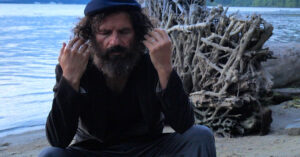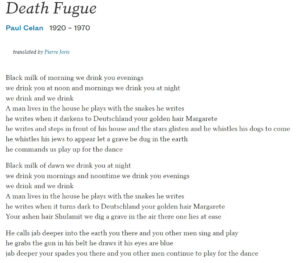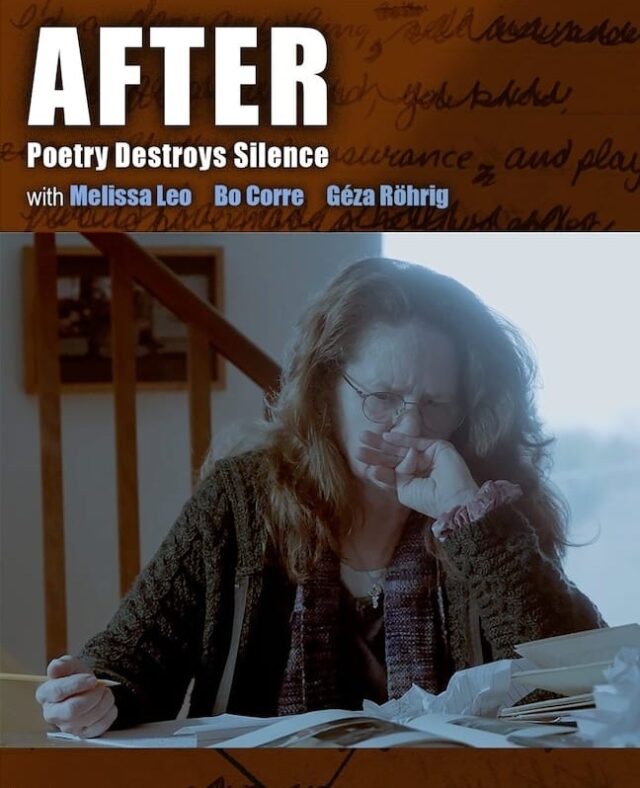How do you write a poem in the shadows of the concentration camps? Given the extremity of such historical trauma, Richard Kroehling’s film underlines the redemptive value of expression.
By John Lavitt
Los Angeles, CA (The Hollywood Times) 11-13-2024
The critique of culture is confronted with the last stage in the dialectic of culture and barbarism: to write a poem after Auschwitz is barbaric, and that corrodes also the knowledge which expresses why it has become impossible to write poetry today.
— Theodor Adorno (*Prisms*, 1955, MIT Press)
In AFTER: Poetry Destroys Silence, one of the most difficult questions is raised. After the unimaginable yet utterly real horrors of the Nazi genocide, how are poetry, art, and any other form of self-expression still possible? Focusing on the written word, director Richard Kroehling excerpts a quote from German philosopher Theodor Adorno, a leading member of the Frankfurt School of critical theory that critiqued modern society post-World War II. Kroehling focuses on a phrase within a sentence: “To write a poem after Auschwitz is barbaric.”
Adorno did not mean that poets should not write. Instead, he suggested that writing in the shadows of the concentration camps cannot avoid the interplay between expression and atrocity. In other words, the extreme trauma of the macrocosm cannot be ignored. There is no escape from the ever-present reality that Auschwitz is a stain on the soul of humanity.
In a Director’s Statement, Kroehling explains his reasons for making the film, “As survivors leave us each day, their voices live inside the poems we include in AFTER. The film serves as both a model and a warning for an increasingly divided and violent planet. AFTER is based on the idea that artmaking has a responsibility to look into the abyss and to address it so that catastrophe becomes a kind of starting point. I want this film to allow cinema and the spoken word to combine and even transcend by creating cinematic evocative images, narrative events, sound design, and performances that ask what it means to write and create in the aftermath of the Shoah, as both as a cautionary notice and lyrical exploration.”
In other words, Kroehling is trying to accomplish a lot with an incredibly challenging subject, and the result is a powerful, uneven film that is hard to process in a single sitting. In a hybrid documentary style, Kroehling bounces like an existential pinball between fiction and nonfiction. For example, the actor Geza Rohrig (Son of Saul) recalls the obsessive visits he made to Auschwitz and how they affected his journey as an individual. He recites his work while recreating moments he experienced in private for the camera.

In a deeper fiction, actor Melissa Leo brings to life Kroehling’s poem “Lost Photo” as an older woman desperately looking for the one photo of a loved one lost in the Holocaust that captures their most authentic essence. A younger version of herself visits her, and Leo chastises the younger woman for having the audacity to light a cigarette. At this moment, the cigarette stands for the carelessness of youth that led to the lost photo.
Although these fictional excavations into trauma are resonant, they pale in comparison to the survivors in the film’s pure documentary segments. For example, an old man wanders around his New York apartment as images of his life are shown, both before and after his time in the concentration camps. He recites a poem that represents how he managed to process the extremity of what happened by fighting for the right to express it. In his life, the writing of poetry allowed him to find the freedom to be a human being again.
In another delving into poetry after the Holocaust, the Romanian-French poet Paul Celan’s poem “Death Fugue” is read in translation while images highlight the words. One of the finest writers of the 20th Century, Celan’s poem is moving and brilliant. Writing in German, he struggles to redeem the language of the concentration camps. Through the repetition of words, he uncovers the dehumanization of being in a concentration camp for days, weeks, months, and years on end. Indeed, survival is not a blessing or a gift but a burden and a grim reality.

In a heartrending segment, a man recites a poem about the suicide of his girlfriend. As the child of Holocaust survivors, she took her own life, and he returned to find her body. He always knew that such a tragedy could happen because the past so profoundly haunted her. Her parents could not keep the extremity of their surviving the concentration camps from infecting her childhood and becoming an unbearable burden. In the poetry, he struggles to process such trauma.
When I review such a film, I want to praise it because I long for such films to find a wider audience. However, in this case, I have been unable to finish this review without pointing out the filmmakers’ errors in judgment and expression. The first error is the haphazard delivery of the scenes without any framing. The lack of context makes the film hard to follow. When you embrace the concept of a hybrid documentary, the audience needs to know what is what and who is who.
A second error is a brutal sound design that includes multiple instances of high-pitched noises. It felt like the Director wanted the audience to experience the trauma experienced by the subjects. Rather than creating a more profound experience, this led to disorientation and a desire to cover one’s ears. In other instances, the film throws trauma into the face of the audience with extreme close-ups and choppy cuts.
If the filmmakers had gotten out of the way of the subject matter, trusting the value of the historical accounts, the beautiful struggle of the poetry, and, ultimately, their audience, AFTER would have been a significant and enduring expression of the Holocaust. Given the challenges presented, however, it will not likely find the audience the poetry deserves. In the less audacious, clearer moments, however, this film has undeniable meaning and resonance.





